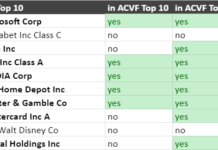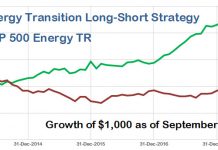Garvin Jabusch
Did you just buy a sustainable mutual fund? No.
The answer is no because human economies are still so far from real sustainability that even a highly idealized portfolio of our most sustainable enterprises necessarily still falls short. Ultimately, the best any portfolio can do is mirror the reality of the world, and today, still, even the best representatives of sustainability can be found wanting compared to what will be required if we would like to keep society thriving indefinitely. At best, whatever fund you just bought can only be described as, to a greater or lesser degree, more sustainable than its non-green counterparts.
Not that we aren’t trying. We work hard to model what a truly sustainable economy – within which civilization could in theory thrive indefinitely – might look like, and then we endeavor to build portfolios of companies that appear to be working toward that world. Unfortunately, this is still anathema to most portfolio managers, who instead subscribe to traditional modern portfolio theory (which can require investing in things like fossil fuels), and even to many ‘green’ money managers who basically view their job as, for example, to remove Exxon from, and add a solar company to, a regulation S&P500 portfolio, but who are otherwise entirely shackled to traditional portfolio construction methods and who don’t seek portfolio innovation.
In a very real sense our economic theories and practices are far closer to imagining what it will take to keep economies growing and maintaining standards of living for a very long time given earth’s climate tolerances and resource limits, than they are to anything taught in traditional academies of finance. Yet, as far as I can tell, true indefinite sustainability is the only viable long term path for human economies, and therefore our methods of managing capital to be a conduit towards the sustainable world (such as via our mutual fund, NEXTX), represent the only course that provides hope for indefinite growth and also the most likely path for long term competitive investment returns. Because, as opposed to what? Crashing into resource limits? Asset management and capital markets are themselves in need of innovation to be effective conduits of capital facilitating the needed economic transformation.
So, to address the question most frequently asked of us: no, we do not practice negative screening to eliminate things we find to be less than sustainable so much as we apply a positive approach to proactively selecting businesses, techniques, technologies, and innovations that are leading the way toward true sustainability. Again, as a practical matter, since the world remains imperfect, we find that it is not yet possible to construct a broadly diversified portfolio that encompasses only perfect sustainability. So, in that sense, we are striving for a goal that is still impossible to realize from a practical perspective.
We believe, however, that in striving for this idealization we come closer, via our portfolios, to reflecting an economy that might be perpetuated indefinitely than do most other practitioners managing client assets. Pure theoreticians in academia or think tanks may say that our portfolios do not yet reflect perfect sustainability. True. We in turn say that that means human economies, although improving, are not yet capable of perfect sustainability. It is no accident that the list of people upon whose work we base our own theories and philosophies contains few, if any, other asset managers. The list of our guiding thinkers goes: Lester Brown, James Hansen, Joe Romm, Ramez Naam, Bill McKibben, and Elon Musk. Validation of the practical economics of our theses comes to us via Warren Buffett, Google, Goldman Sachs (believe it or not), and Elon Musk.
Daunting as it may be, striving for perfect sustainability is important. Because coming close to large-scale idealized sustainability is the only way our civilization can thrive going forward. So we are determined to keep reaching for practical realizations of this ideal, whether or not others agree with our vision, and whether or not some even believe in the science that to us so clearly demonstrates that present economies of non-sustainability can no longer serve our economic or societal advancement.
Strange as it may seem, there are still many in the investment industry, even among those who represent as “green” portfolio managers, who believe fossil fuels represent a resource that can somehow power civilization for the very long term. We believe in the polar opposite, as was well articulated in a recent Tweet from energy economist Gregor MacDonald: “Friendly reminder: we are in midst of a historic energy transition, away from liquid BTU to the power grid. Oil Age is in steep decline. Fact.”
We simply don’t see fossil fuels as primary power in an indefinite, growing economy, and we think the share prices of fossil fuels firms will, in relative terms, underperform over time as a result. Portfolio managers still clinging to fossil fuels as a source of low risk returns are, in practical terms, in terms of outcomes, no different than those who deny climate change in the first place. To thus simplify the narrative of energy as it is emerging now is to distort reality. We must ignore the rationalizations of these groups and instead hew close to our models of real, long term sustainability.
Ultimately the question becomes one of ‘do we think human society is something worth preserving or not?’ I understand that there are those (perhaps many in fact) who with no small hint of nihilism believe that humanity should just be allowed run its course and that in the end we deserve whatever we get, even if that means we don’t go on for very many more decades or centuries. For us, until it can be demonstrated conclusively that society is well past the point of no return on the path to oblivion, we’ll continue to believe in and work with others to bring about a better world. Of course believing that this is the only long term economic path forward means we also believe we have every shot at very competitive investment returns along the way.
Remember, the two key transitions we need to achieve long term sustainability are (1) truly renewable energies and (2) close–to-perfect recycling or circular use of existing resources already in the human economy (waste-to-value economics). These two key disruptions to our current economic system serve the larger goal of getting more and more economic value out of less and less stuff, and less and less energy. Because it’s in reaching the point where we have high standards of living without further degrading the ecological underpinnings of our existence that we see the ideal state of the next economy. This is what we strive for; this is what we envision as we select companies with which to build our portfolios.
Renewable energies and waste-to-value economics continue to advance against fierce resistance from human homeostasis, which, based in fear, latches onto the ways of the past in the hope that this somehow will hold the world together. As a result, because of this aspect of our basic nature, we’ll always face the risks of failure and collapse. Thus far, though (with some notable exceptions such as Easter Island), we’ve always managed to innovate ourselves out of trouble and into a better world. This time will be no different. Yes, we’ll have to struggle to reach our ideals, but that’s what growth is.
Garvin Jabusch is cofounder and chief investment officer of Green Alpha ® Advisors, LLC. He is co-manager of the Shelton Green Alpha Fund (NEXTX), of the Green Alpha ® Next Economy Index, and of the Sierra Club Green Alpha Portfolio. He also authors the Sierra Club’s green economics blog, “Green Alpha’s Next Economy.”









Quiet an interesting blog shared! We as responsible citizens need to preserve the environment.